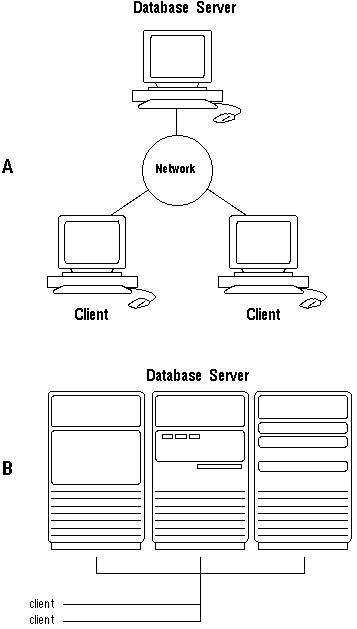| Oracle7 Server Concepts Manual | Library |
Product |
Contents |
Index |
| Oracle7 Server Concepts Manual | Library |
Product |
Contents |
Index |
Jomo Kenyatta
This chapter defines distributed processing and how the Oracle Server and database applications work in a distributed processing environment. This material applies to almost every type of Oracle database system environment. This chapter includes:
Although the client application and Oracle can be executed on the same computer, it may be more efficient and effective when the client portion(s) and server portion are executed by different computers connected via a network. The following sections discuss possible variants in the Oracle client/server architecture.
Note: In a distributed database, one server (Oracle) may need to access a database on another server. In this case, the server requesting the information is a client. See Chapter 21, "Distributed Databases", for more information about clients and servers in distributed databases.

Figure 20 - 1. The Client/Server Architecture and Distributed Processing
Benefits of the Oracle client/server architecture in a distributed processing environment include the following:
SQL*Net uses the communication protocols or application programmatic interfaces (APIs) supported by a wide range of networks to provide a distributed database and distributed processing for Oracle. A communications protocol is a set of standards, implemented in software, that govern the transmission of data across a network. An API is a set of subroutines that provide, in the case of networks, a means to establish remote process-to-process communication via a communication protocol.
Communication protocols define the way that data is transmitted and received on a network. In a networked environment, an Oracle server communicates with client workstations and other Oracle servers using SQL*Net. SQL*Net supports communications on all major network protocols, ranging from those supported by PC LANs to those used by the largest mainframe computer systems.
Without the use of SQL*Net, an application developer must manually code all communications in an application that operates in a networked distributed processing environment. If the network hardware, topology, or protocol changes, the application has to be modified accordingly.
However, by using SQL*Net, the application developer does not have to be concerned with supporting network communications in a database application. If the underlying protocol changes, the database administrator makes some minor changes, while the application requires no modifications and will continue to function.
The SQL*Net drivers take SQL statements from the interface of the Oracle tools and package them for transmission to Oracle via one of the supported industry-standard higher level protocols or programmatic interfaces. The drivers also take replies from Oracle and package them for transmission to the tools via the same higher level communications mechanism. This is all done independently of the network operating system.
Additional Information: Depending on the operating system that executes Oracle, the SQL*Net software of the database server may include the driver software and start an additional Oracle background process; see your Oracle operating system-specific documentation for details.
For additional information on SQL*Net, refer to Understanding SQL*Net or the appropriate SQL*Net documentation.
|
Prev Next |
Copyright © 1996 Oracle Corporation. All Rights Reserved. |
Library |
Product |
Contents |
Index |